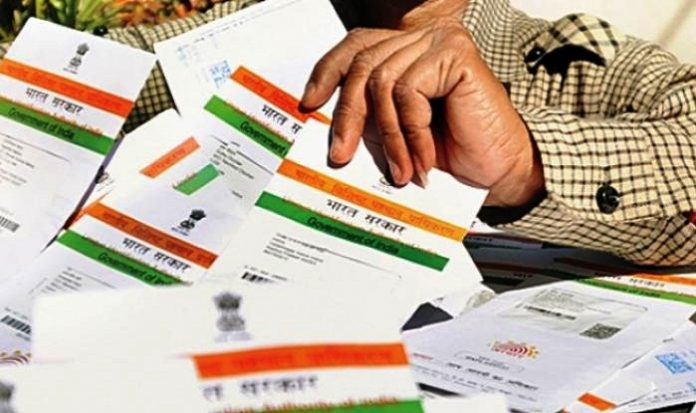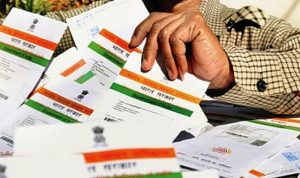Aadhaar Bench assembled with a slight delay due to Padmavaat hearing. However, the focus of entire hearing today was the much revered Privacy judgment and the Aadhaar Act. Mr. Shyam Divan, senior advocate, continued the argument on behalf of the petitioners. He read out the following from the privacy judgment:
#1 Dangers of profiling through integrating different sets of data.
#2 Concept of informational privacy
#3 Impossible to visualise in advance all the possible harms that can result from proliferating data sets
#4 Complex issues big data and power
1# Transparency, consent and non discrimination in the context of the states relationship with the personal data.
2# Limitations on privacy – there must be a legitimate State aim, and restriction must be proportionate.
3# Privacy – integral element to right to life and any limitation must be within the constitutional framework.
Mr. Divan, “Privacy is the constitutive core of human dignity and the foundation of ordered liberty. It recognizes the individual’s right to control vital aspects of their life. It is not lost or surrendered merely by being in a public place. The interpretation of privacy must be flexible, to meet evolving challenges.” – From the privacy judgment.
Mr Divan post reading Justice Chandrachud’s plurality opinion moved on to read Justice Chelameswar’s concurring opinion in the judgment which talks about the constitution as securing freedom for every generation of Indians. He highly spoke of the inter-relationship of Article 19 (freedom of speech and expression) and Article 21 (Right to life and personal liberty) of the constitution.
The focus area of Mr. Divan’s reading from the judgment was :
#1 Privacy consisting of open court recourse, sanctuary and intimate decisions.
#2 Fundamental rights are the firewall between the individual and concentrated state power.”
He then moved on to read Justice Bobde’s concurring opinion which read as under:
#1 The Constitution transformed Indians from subject under a monarch to citizens of a Republic.
#2 Privacy in Indian intellectual thought – draws the link between privacy, dignity and liberty.
#3 Privacy as a “travelling right.” – It is a sprignboard to other rights such as speech, etc.
Mr. Divan then moved on to read part of Justice Nariman’s concurring opinion :
“#1 Privacy is not an elitist concept.
#2 The state’s argument that privacy was an elitist concept springs from its defense of the Aadhaar Act.
#3 In order to restrict privacy, the state’s interest must be ‘compelling.’
Mr. Divan moved ahead to read out Justice Kaul’s concurring opinion:
#1 Some people may not attach great importance to privacy – this is no reason to recognize it as a right.
#2 Edwards Snowden, data profiling, the definition of data profiling and the potential of profiling for both good and evil.
#3 Digital footprints – various type of data that big data can exercise.
#4 The right of the individual to control information about herself.
#5 Privacy of children require special concern.
#6 Privacy is particularly important in a country as diverse as India
Mr. Divan reads out the unanimous conclusion of the 9 judges that held that privacy is a fundamental right in the Indian Constitution.
Mr. Divan summarizes that the judgment affirms that privacy has always been a fundamental right and the correct position has been established by various judgments after Karaghsingh.
8 Takeaways from the privacy judgment, as per Mr. Divan:
#1 Privacy is a natural right, a condition precedent to the enjoyment of any fundamental right, it includes the right to control the dissemination of information.
#2 The sanctity of privacy lies in its relationship with dignity. Privacy is a postulate to human dignity itself.
#3 Privacy is integral to liberty and freedom. It is more than a derivative right – it is a foundation right.
#4 Privacy has both negative and positive components. In it’s negative concept, it protects the individual from the state. In it’s positive aspect, it casts an obligation on the state to protect its individuals from non-state actors.
#5 Privacy is not an elitist concept. Subordination of civil and political rights to economic and social rights has been used for some of the most egregious voilation in the history.
#6 Knowledge is power, information is silos. When aggregated it can be a threat to freedom.
#7 Privacy can be restricted only by a law that is just, fair and reasonable.
#8 The rule of law and necessity of judicial remedies.
Bench rose for lunch and reassembled at 2:30:
Mr. Divan starts with the Aadhaar Act and starts with definition clause. Mr. Divan starts by saying that he will be commenting post taking the court through the statute. He starts by reading out the statement of objects and reasons of the Aadhaar Act focusing on the need for proof of identity, identification of beneficiaries, transfer of benefits, etc followed by the Preamble and the Long Title.
Mr. Divan on definition clause.
#1 Authentication Process and Authentication Record – which refers to the record of time of authentication, the identity and the response of the requesting entity. Mr. Divan emphasized that thus the identity of the entity is known.
#2 Benefits, bio metric information (clause g) and core-biometric information. He states that both the clauses are open ended for interpretation.
#3 Enrollment agencies – even after the act remains private.
#4 Registrar – just as in the pre-act regime, registrar need not necessarily be a government body.
#5 Requesting entities – that submit biometric information to CIDR for authentication.
#6 Resident – Who has lived in India for at least 180 days in the last 12 months. Mr. Divan calls this definition rather curious.
#7 Service and Subsidies – Mr. Divan referred to them as open ended as well.
Mr. Divan then invited the attention of the court to section 3 of the act which deals with enrollment. He points out that the words used here are “shall be entitled to obtain”, consequently getting an Aadhaar number is a right and not an obligation. He reiterated his previous point that the authentication process is probabilistic.On counselling requirement under section 3, he said that the concept of informed consent which is reflected by the counselling requirement will become completely illusory if the mandatory character is upheld.
Mr. Divan went ahead to read section 4. He reiterated his point that the enrolment procedure is completely compromised and has no oversight. Under Section 4(3) the data can be used as a proof of identity for any purpose. He then moved to S.6. It provides for updating of the data. He states that biometric information changes over time. This compromises the whole idea of uniqueness. He went ahead to read S. 7 which effectively allows Aadhaar to be made mandatory for receiving the benefits or services. He asserts that this provision negates the right of the individual to identify herself in the reasonable alternative manner.
Mr. Divan took the court through section 4 of the act which established the UIDAI and points to section 23 which lays out the powers and functions of the UIDAI. He stated the UIDAI has been given vast powers for example, to add biometric indicator such as DNA under regulations.
He further stated that UIDAI is allowed to contact out of the security of the database. He says, “this raises a security concern and has been documented and shown in the records.” Mr. Divan stated that as per the act UIDAI has the power to deactivate the Aadhaar number. This means that it effectively has the power to deprive an individual of all her civil rights. He then pointed to section 23(3) which allows UIDAI to enter into an MoU with other bodies – public and private.
Mr. Divan then referred to Chapter VI of the Aadhaar act which deals with protection of the information. He states that, “all the information that the act says you cannot share has already been shared”
Justice Chandrachud then questioned Mr. Divan, “How does breach of the statutory provision effect the constitutionality of the act itself?”
Mr. Divan argued that the statute is unconstitutional which seeks to sanctify the Aadhaar programme, which is incompatible with the free and open democratic.
Justice Chandrachud said that there are two claims. First that the program is unconstitutional, second that there have been breaches that need to be plugged. He then questioned Mr. Divan as to whether he will be making both arguments?
Mr. Divan replied saying that the key question is whether an individual is entitled to protect herself by making a choice about which method to use to identify herself? The breaches help to substantiate the strength of this basic claim. The claim to make a choice.
He further argued that the concern is that you will end up having a complete surveillance society of this system in its present form is allowed to stand.
Mr. Divan took the court through Section 32 of the act, these deals with storage of metadata. Mr. Divan said that he is not saying that somebody’s sitting and tracking you. He meant that the architecture is what enables a surveillance state.
Justice Chandrachud questioned Mr. Divan, “We are living in a networked world, where private parties are any way tracking everyone in great detail. So how does the interpolation of an Aadhaar number really change anything?”
Mr. Kapil Sibbal, Senior Advocate answered this question by saying that, “the key issue is whether in this networked world, a single form of identity to which everything is linked is safe.”
Justice Chandrachud asked, ‘”Can’t you obviate the aggregation of datasets by specifying in the law that data can be used only for the purpose for which it is collected?’
Mr. Divan said that there is a crucial difference between private parties and the State. With private parties one can always opt out.
Justice Chandrachud asked, to what extent do you have an actual choice in today’s world, even with respect to the private parties?
Mr. Divan replied that the point is that the state has far more powers with respect to an individual than a private party.
Mr. Divan argued that in a democracy there has to be a certain amount of trust between the state and an individual. So when an individual says that she has an alternative way of identifying herself, her state needs to accord that basic trust and respect and allow it, as long as that alternative is reasonable. Mr. Divan took the court through Section 33, this deals with disclosure of information in certain cases. He then moved to section 47 – cognizance of offenses. He said that an individual does not have any locus to approach the court as per this provision. He then moved to section 48 – stating that in case of public emergency the entire record will go into the hands of central government. After which he moved to section 57 – which talks about the use of Aadhaar for other purposes than mentioned under the act. This section instead of confining the usage, extended the use to almost every entity – not just under a law but under the contract.
Justice Sikri then questioned, “What is the harm if you are just giving the number but nothing else. i.e., no biometrics.”
Mr. Divan replied you may not want to have this information spread around. The number when used with other information, publically available can be compromising.
Justice Chandrachud replied that the biometric information remains only with CIDR.
Mr. Divan said this is not the case by giving the example of fingerprints being skimmed off.
Bench rose for the day at 04:00, arguments to continue tomorrow.
For more updates and latest legal news, follow iPleaders at https://www.facebook.com/iPleaders/, you can also find us on twitter at https://twitter.com/LawSikho if you want more such legal news follow us on https://blog.ipleaders.in/.
 Serato DJ Crack 2025Serato DJ PRO Crack
Serato DJ Crack 2025Serato DJ PRO Crack










 Allow notifications
Allow notifications


